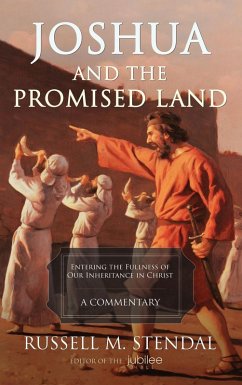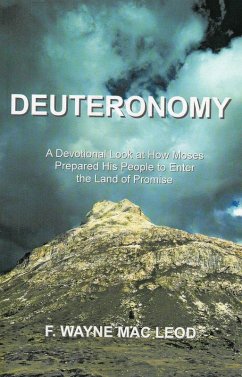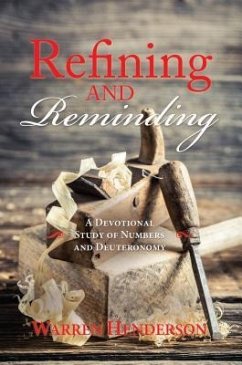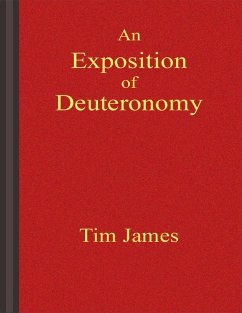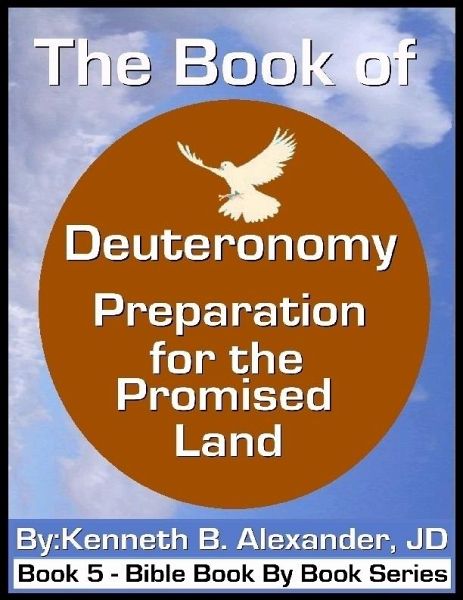
The Book of Deuteronomy - Preparation for the Promised Land (eBook, ePUB)

PAYBACK Punkte
1 °P sammeln!
Deuteronomy, the fifth Book of the Jewish Torah and the Greek Pentateuch, was so named by the Greek version of the Old Testament the Septuagint (LXX). The book got its name by a misreading of Deut. 17:18 which indicates that the Book is "a copy or repetition of the Law previously given at Sinai". Actually the Law given in Deuteronomy is somewhat different from the Sinai Law. Jews call the Book "Elleh haddevarim" meaning "These are the Words" or simply Devarim meaning "words". In Jewish tradition it is called "Mishneh Torah" meaning a repetition or copy of the Law. In an event the Book is compo...
Deuteronomy, the fifth Book of the Jewish Torah and the Greek Pentateuch, was so named by the Greek version of the Old Testament the Septuagint (LXX). The book got its name by a misreading of Deut. 17:18 which indicates that the Book is "a copy or repetition of the Law previously given at Sinai". Actually the Law given in Deuteronomy is somewhat different from the Sinai Law. Jews call the Book "Elleh haddevarim" meaning "These are the Words" or simply Devarim meaning "words". In Jewish tradition it is called "Mishneh Torah" meaning a repetition or copy of the Law. In an event the Book is composed a speech of Moses given to the Israelites in Moab as they prepare to cross the Jordan to take possession of Canaan. The first law was given for the Israelites in the wilderness. This second law applies to an entirely new nation as they prepare to enter into Canaan. The Book is almost entirely a dialog by Moses covering many areas. Much of it is repetition. However it was necessary to repeat the Law for the children of those who had perished in the wilderness by the judgments of God since may have not have been familiar with the first law. The Ten Commandments are redone, the three feasts are reiterated, a complete history of their wanderings in the wildernessis given and a review of the basic law is spoken. The book is almost a condensation of the Books of Exodus, Leviticus and Numbers, presented to an entirely new generation. The most significant part of the Book is Moses for us today is the warning of the blessings or the curses that will befall Israel in its coming history dependent on whether they followed God or not. In those passages are answers to those who ask why there is evil in the world despite a loving God. Moses makes it very clear that if a nation follows God they will receive only blessings. But if it does not follow God, He will bring curses. Moses said: "See, I am setting before you today a blessing and a curse: the blessing, if you listen to the commandments of the LORD your God, which I am commanding you today; and the curse, if you do not listen to the commandments of the LORD your God, but turn aside from the way which I am commanding you today, by following other gods which you have not known" (Du. 11:26-28). Why is there so much evil in the world? We brought it on ourselves with a lot of help from the evil one. As an example when Israel was in the wilderness, and under the hand of God's Law, they had food every day, had no disease common to man, their clothes did not wear out, and they had shade in the desert by day and fire at night for warmth. They were led by a word from God and had the promise of a better future in the Promised Land i.e. they had a vision of hope. In our world there is little hope for a better day. One prominent sin that goes largely unnoticed is the sin of idolatry. Idolatry means worshipping something that is not God. In Israeli history the sin that brought the most grief to them was idolatry. Worship is defined as: "the attitude and acts of reverence to a deity". The term 'worship' in the Old Testament translates the Hebrew word meaning 'to bow down, prostrate oneself,' a posture indicating reverence and homage given to a lord, whether human or divine (Harpers Bible Dictionary). Whether we realize it or not our current society is full of Idolatry. We worship everything from movie stars, religious figures, our possessions, our way of life, our cars, our houses, the list goes on. Anything in our lives which takes our admiration and puts it on something or somebody is worship. Advertising and films exalt the female body and we can even worship our sin (hedonism). In God's eyes nothing can rival Him for our affections. In this world nearly everything does. As a result we live our lives in darkness and sin abounds. The land of Israel experienced intermittent periods of blessings and curses. When they were not following God nations rose up and conquered them-Assyria, Babylon, Syria and finally Rome. This was all due to their disobedience. We now have Jesus Christ to show us the way to the Kingdom but who really believes in the extent of His provision? The coming Kingdom of God will contain all the blessings proclaimed by Moses but it will be because all will know the Lord and no iniquity will dwell there.
Dieser Download kann aus rechtlichen Gründen nur mit Rechnungsadresse in A, D ausgeliefert werden.




